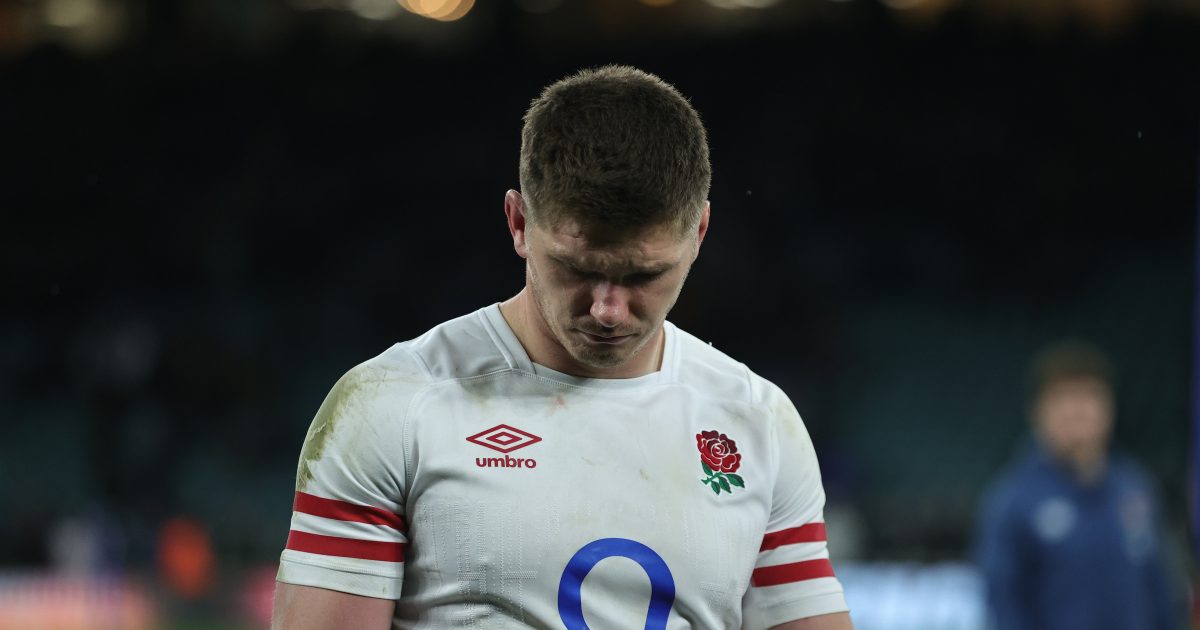Owen Farrell cops a bans but tackle school can free him for England

Owen Farrell has been banned following his citing for foul play with Saracens – but he won’t miss the start of the upcoming Guinness Nations with England provided he successfully completes the World Rugby coaching intervention programme which would scratch the final match of his four-game suspension.
There were 74:22 minutes gone on the Gallagher Premiership clock last Friday when the right shoulder of recent England skipper Farrell collided with the head of the ball-carrying Jack Clement on the Gloucester ten-metre line.
After play eventually halted six phases later with the clock now on 76:18, referee Karl Dickson refused to review the footage with his TMO and it led to Farrell getting cited on Monday by the RFU and asked to attend an independent disciplinary hearing that began on Tuesday at 6:30pm.
The verdict has now been delivered following that hearing and the outcome was a four-game ban that can be reduced to three games provided Farrell completes tackle school. An RFU statement read: “The case of Owen Farrell, Saracens, was heard last night by an independent disciplinary panel chaired by Philip Evans with Becky Essex and Mitch Read.
“Farrell was cited following the game against Gloucester Rugby on Friday, January 6, for dangerous tackling, contrary to World Rugby law 9.13.
“Farrell accepted foul play but challenged that it met the red card threshold. However, the panel upheld the charge and Farrell received a four-match ban. This will be reduced to a three-week ban if the player completes the World Rugby coaching intervention programme.
“Farrell will miss the following games: 14/01 vs Lyon, 22/01 vs Edinburgh, 28/01 vs Bristol, 19/02 vs Leicester Tigers.”
The England matches versus Scotland on February 4 and Italy on February 12 weren’t included in this projected ban timetable as the Test squad won’t be announced until next Monday, January 16, by Steve Borthwick, hence the inclusion instead of the mid-February Saracens match versus Leicester in the suspension schedule.
However, if Farrell successfully completes tackle school, his ban will be completed by late January, freeing him to play for England at the start if February if selected.
In his evidence at the hearing, Farrell told the panel he had played approximately 340 professional games and in regards to the tackle at Gloucester, he acknowledged it was his responsibility to tackle safely.
“He said he was expecting his opponent to run over him so he dropped his height to where he felt the tackle would be properly executed. He hinged both at the hips and at the knees. He said in hindsight he would have liked to have been a couple of inches lower.
“He said a number of times that he felt he had made primary contact through the chest area and that he had made a fair tackle. He said he believes all his force went through the chest area. He said he thought it would have felt different had he put the force through the chin.
“It was only when he got on the team bus to come home that he watched the clips and realised contact was made with the chin. When he realised he contacted his opponent to apologise. He denied the suggestion made by the RFU that he had caused the chin to be pinned backwards by his contact.
“The player helpfully talked the panel through the footage and as he did so he explained why he felt the force went through the chest area rather than the chin. He felt that the contact with the chin was not significant. It was described as fleeting. He said his opponent continued to contest the ball following the tackle and then continued to play in the rest of the game.”
The judicial committee believed that the Farrell offence was in the mid-range of seriousness and in applying mitigation to the six-week entry point, it concluded: “Given the player’s previous offending he is not eligible to receive the 50 per cent reduction for mitigation which would otherwise be available to him.
“However, given the player’s timely acknowledgment of his offending and considering his behaviour following the incident, during the hearing and leading up to the hearing, sitting alongside other mitigation available to him the panel does feel able to reduce the sanction by a period of two weeks.”
- Click here to read the ten-page written judgment from the Owen Farrell disciplinary hearing










































































In the south last year a couple of bans were handed down against a date rather than a number of weeks. Seems to me a better way to go to avoid the game playing of pretending they would have played X or Y game. The Aussies did the same, naming Swain for an Aus A tour of Japan he was never going to play in so as to get his ban over ahead of the autumn. Not sure which bodies are allowed to do bans the specific date way, but I'm all for it.
I guess he has a difficult decision to make now. Does he go to the tackle school, or does he just take the full ban?
"What do you mean I have to tackle below the shoulder teach? Why didn't someone tell me this 100 tests ago?!"